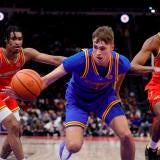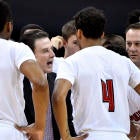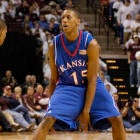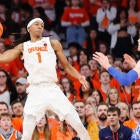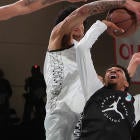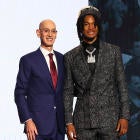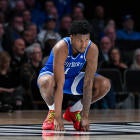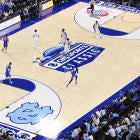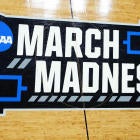They're going to take down a banner.
By God, the NCAA is going to take down a banner.
That's really the only conclusion that can be taken from Thursday's release of the NCAA report on the Louisville basketball program's strippers-and-sex scandal, right?
There were plenty of notable punishments in the report. Coach Rick Pitino is suspended for the first five ACC games of the coming season. Andre McGee, the former director of basketball operations at the vortex of the scandal, received a 10-year show cause penalty from the NCAA, which effectively will end his basketball career. Louisville's basketball program will enter into four years of probation.
But make no mistake about which was the bombshell. All those punishments, plus the NCAA's acceptance of Louisville's prior self-imposed sanctions, would be but a slap on the wrist if it weren't for this paragraph, the sixth of 14 bullet points in the NCAA's release of its punishments:
"A vacation of basketball records in which student-athletes competed while ineligible from December 2010 and July 2014. The university will provide a written report containing the games impacted to the NCAA media coordination and statistics staff within 45 days of the public decision release."
This can only be read one way: The NCAA is going to do something it long has been loathe to do -- and it's the most remarkable part of this news. They're going to take down the NCAA championship banner that hangs in Louisville's home arena from the 2013 NCAA tournament. They're going to erase one of the most exciting teams in recent college hoops memory -- Pitino's perfect defensive group, with Peyton Siva and Russ Smith, Montrezl Harrell and Gorgui Dieng and Kevin Ware -- from NCAA history.
This is the bombshell. This is why Louisville immediately announced it would appeal. This is why Pitino, in a press conference shortly after the punishments were announced, called the NCAA decision "unjust and "over the top" and "severe." "Personally I've lost a lot of faith in the NCAA and everything I've stood for for 35 years with what they just did," Pitino said.
This is why Pitino's attorney immediately released a statement slamming the NCAA for indicating it's going to do something it never has done. "The finding against Coach Pitino is one of the weakest I've ever seen against a head coach," said Pitino's attorney, Scott Tompsett. "The decision hinges on a vaguely-worded rationale about creating an environment in which the violations actually occurred, alleged delegating of monitoring to assistant coaches and Mr. Pitino's failure to train Mr. McGee. Today's decision breaks with accepted head coach control precedent and imposes a standard of strict liability."
This is a shocking flexing of regulatory muscle by an organization whose reputation has suffered in recent years with its controversial handlings of scandals at the University of Miami and Penn State.
This is the biggest NCAA ruling since giving the death penalty to SMU's football program in the 1980s. Maybe this decision forever ruins Louisville basketball like the 1987 decision forever ruined SMU football, though I doubt it. But this is a forever smear on a historic basketball program and a Hall of Fame coach.
I'm not sure how I feel about how hard the organization came down on the program in general and Pitino in particular. I had always thought this case would rise or fall on whether Pitino had contemporaneous knowledge of the sex parties McGee was organizing for players and recruits. Morally, I still believe that's correct: It's a whole lot different to me whether Pitino knew of these parties, or was involved in these parties, or purposefully turned a blind eye to these parties, than if this was the actions of one rogue actor who danced outside the rules without Pitino's knowledge, as Pitino and the university have claimed all along.
But the NCAA did not differentiate. What the NCAA said Thursday was it doesn't matter whether Pitino knew or whether he didn't know. They charged him with "failure to monitor." The fact that a lack of oversight -- as opposed to a deliberate and institutionalized scandal -- is enough for the NCAA to take the unprecedented step of tearing down a banner.
Back in 2014, in a story about North Carolina's academic scandal that affected the basketball and football programs -- a scandal that, three years later, has yet to be fully adjudicated by the NCAA -- The Sporting News' Mike DeCourcy wrote about the NCAA's longtime reluctance to tear down championship banners.
"There has been only limited reticence in regards to vacation tournament participation, even that which resulted in Final Four appearances," DeCourcy wrote. "But the NCAA has tread lightly upon teams that celebrated championships. There have been 76 NCAA basketball champions crowned, from Oregon in 1939 to Connecticut in 2014. Every single one of those titles remains in place. Ten of the 304 teams that reached the Final Four have had their records vacated by the NCAA, however. How fortunate for the NCAA that it's never had to strip a champion, right?"
It makes sense that tearing down a banner is a last resort. The NCAA Tournament is the organization's marquee event -- by far the biggest moneymaker that keeps the organization afloat. The broadcast rights for March Madness were extended a year ago through 2032, an eye-popping eight-year, $8.8 billion extension. More than 23 million people watched the title game this April between Gonzaga and North Carolina. National titles forever etch coaches and their programs into sports lore. The Louisville-Michigan title game in 2013 was my first title game, a spectacular game I'll forever remember, even if the NCAA scrubs it from history.
And so, for the NCAA to indicate that it's planning to tear down Louisville's 2013 banner indicates how seriously it took the unprecedented allegations of what happened at Billy Minardi Hall on Louisville's campus. The only comparable moment in the NCAA's recent past was when the organization stripped USC's football team of its 2004 BCS championship. That had to deal with Reggie Bush's dealings with agents, which violated NCAA amateurism rules.
How quaint that looks today, in the face of a much more sensational story at Louisville.
Don't get me wrong: It's a long time between now and when the banner gets taken down. As is often the case with NCAA investigations, this will continue to be a verrrrrry deliberative process. Louisville immediately said it will appeal. Teams of lawyers will get involved. Fan bases will be up in arms. This is the middle of the story, not the end. But you better believe that other schools -- particularly North Carolina, whose 2005 national title feels like it's hanging in the balance a whole lot more today than it was yesterday -- were stunned by the NCAA's punishment. I don't mean to throw the North Carolina scandal into this as an aside. What happened at North Carolina with paper classes in the Department of African and Afro-American Studies, where many student-athletes were fraudulently enrolled in bogus classes, is a completely different situation than what happened at Louisville. And while the events at Louisville are more sensational -- strippers! paying for sex! doing so with teenage recruits! -- North Carolina's hits more at the heart of what the NCAA stands for, the marriage of academics and athletics. If you're UNC, you're not feeling any schadenfreude about what happened to your ACC opponent. You just started feeling a bit more uncomfortable.
An earthquake shook through college sports Thursday morning. And you better believe everyone was paying attention. Even the schools that have national championship banners hanging in their rafters. Because starting today, even national titles aren't immune from the heaviest of penalties.








